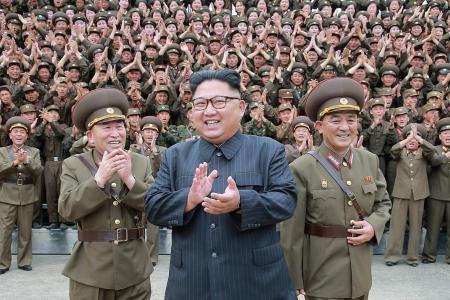North Korea's missile success is expected
Kim Jong Un's nuclear strategy aims to safeguard his rule
On Oct 3, 1942, a prototype German V-2 rocket launched from the German military firing range at Peenemunde in the Baltic reached an altitude of 84.5km.
It was, by some definitions, the first human-built object in space.
It was the height of World War II, and with the entry of the United States into the conflict, the tide was turning against Adolf Hitler and the Nazis. But they knew that if they could perfect both the world's first ballistic missiles and win the race to an atomic bomb, they would become virtually unassailable.
Luckily, Hitler did not achieve this.
But it is a lesson North Korea's Kim Jong Un appears to have taken to heart.
With two tests of his latest Hwasong-12 ballistic missile on July 4 and 28, he looks to be on the edge of achieving what America's enemies have dreamed of - the ability to hit the US mainland with nuclear force.
It is a strategic sea change that has been a long time coming - and which many in the US defence establishment have long expected. It is doubtful either North Korean or US officials genuinely know how accurate North Korea's rockets would be at intercontinental range.
Already, the US Defense Intelligence Agency is reported to be operating under the assumption that North Korea has perfected a warhead that fits on a rocket.
Mr Kim's progress on rockets is clearer.
Analysis by the London-based International Institute for Strategic Studies of footage of the latest two launches suggests Pyongyang has a working rocket motor based on Soviet rocket engines not used by Russia since the 1990s.
For all the fears of the Cold War era, there was often a general feeling that "mutually assured destruction" could keep things under control.
That is seen as less certain with Mr Kim, but the point of his nuclear programme has been to safeguard his rule, not bring it to a cataclysmic early end.
The problem will come if and when the wheels start to come off the rule of the North Korean leadership. There is no reason to believe it is on the verge of collapse, but pressures on it will continue to rise.
Mr Kim's hope seems to be that the more potent his nuclear capabilities, the more the rest of the world feels it has no choice but to allow him to stay in position. But the opposite may happen.
This month's unanimous United Nations Security Council resolution to impose new sanctions sparked by the missile tests will notably increase economic strains on North Korea.
China is frustrated and is tightening the screws on Pyongyang with a ban on importing North Korean products such as coal and iron.
Earlier this year, I chaired a panel that included former senior US officials examining what might happen if the North Korean regime collapsed.
Their conclusion was stark. If Mr Kim felt he was about to be ousted or killed, he would almost certainly launch. Likely targets would be Japan and, if he could reach it, the US mainland.
US-operated antiballistic missile batteries based in Japan and South Korea are supposed to provide a last-ditch defence against this. However, such technology remains in early stages. Shooting down a fast-falling ballistic missile remains difficult, if not impossible. Shooting down many is harder still.
All this helps explain the last round of speculation over a potentially imminent strike, intensified by President Donald Trump's talk of "fire and fury" and military options being "locked and loaded".
The dangers of a conventional war on the Korean peninsula, particularly North Korean conventional artillery strikes on the South Korean capital of Seoul, were enough to deter presidents Bill Clinton, George W. Bush and Barack Obama from taking military action against Pyongyang.
North Korea's latest missile tests arguably put even more pressure on Mr Trump to make the same calculus.
Should he strike, some will unquestionably accuse him of simply trying to distract from domestic political woes.
If disaster does come, the US may well regret acting or not having acted sooner.
In reality, it may always have been inevitable America would face a situation like this. Perhaps the surprise should be that it has taken this long. - REUTERS
The writer is a Reuters global affairs columnist.
Get The New Paper on your phone with the free TNP app. Download from the Apple App Store or Google Play Store now



